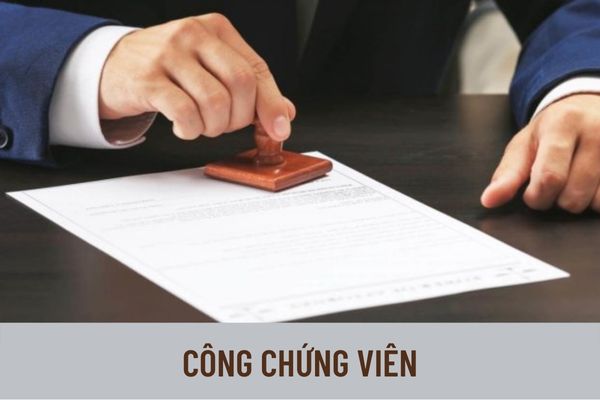Vietnam: Can I work as a notary without a bachelor of law degree? What does a dossier of request for appointment as a notary include?
If I don't have a bachelor of law degree but want to be a notary, what conditions must I meet?
Pursuant to Article 8 of the 2014 Law on Notarization of Vietnam on the criteria for notaries in Vietnam as follows:
Criteria for notaries in Vietnam
A Vietnamese citizen who permanently resides in Vietnam, observes the Constitution and law, has good ethical qualities, and fully satisfies the following criteria shall be considered for appointment as a notary:
1. Having a bachelor of law degree.
2. Having performed legal work at agencies or organizations for at least 5 years after obtaining the bachelor of law degree.
3. Having graduated from a notary training course as prescribed in Article 9 of this Law or completed a notary re-training course as prescribed in Clause 2, Article 10 of this Law.
4. Meeting requirements on notarial practice probation results.
5. Being physically fit for notarial practice.
Thus, in case an individual wants to work as a notary, the first condition must be that he/she has a bachelor of law degree and meets the criteria specified above to be considered and appointed as a notary.
Therefore, if you do not have a bachelor of law degree, you will not be able to work as a notary.

Vietnam: Can I work as a notary without a bachelor of law degree? What does a dossier of request for appointment as a notary include? (Image from the internet)
What does a dossier of request for appointment of notaries include?
According to the provisions of Clause 2, Article 12 of the 2014 Law on Notarization of Vietnam, a dossier of request for appointment as a notary comprises:
Appointment of notaries
1. Those who fully satisfy the criteria prescribed in Article 8 of this Law may request the Minister of Justice to appoint them as notaries. Dossiers of request for appointment as notaries shall be sent to the provincial-level Justice Departments of the localities where the requesters have registered for notarial practice probation.
2. A dossier of request for appointment as a notary must comprise:
a/ A written request for appointment as a notary, made according to a form set by the Minister of Justice;
b/ The requester’s judicial record;
c/ A copy of the bachelor of law, master of law or doctor of law degree;
d/ Papers proving the working seniority in the legal sector;
dd/ A copy of the certificate of graduation from a notary training course. For those exempted from notary training, a copy of the certificate of completion of a notary re-training course and papers proving the eligibility for exemption from notary training as prescribed in Clause 1, Article 10 of this Law;
e/ A copy of the certificate of notarial practice probation results;
g/ A health certificate granted by a competent health agency.
Thus, an individual who meets the notary criteria shall make a request for appointment of a notary.
In particular, an application for appointment of a notary is prescribed according to the form in Clause 3, Article 30 of Circular 01/2021/TT-BTP of Vietnam as follows:

Download the application form for appointment of a notary here.
What are prohibited acts for notaries?
According to the provisions of Article 7 of the 2014 Law on Notarization of Vietnam on prohibited acts for notaries, specifically:
- Disclosing information on the contents of notarized documents, unless notarization requesters so agree in writing or otherwise provided by law; using information on notarized contents to infringe upon lawful rights and interests of individuals and organizations;
- Notarizing contracts, transactions or translations the purposes and contents of which violate law or are contrary to social ethics; inciting or creating conditions for parties to contracts or transactions to conduct sham transactions or commit other deceitful acts;
- Notarizing contracts, transactions or translations which are related to properties or interests of their own or of their relatives being spouses; natural parents, adoptive parents; natural parents, adoptive parents of their spouses; natural children, adopted children or children-in-law; grandparents, siblings or siblings-in-law; and natural grandchildren, adopted grandchildren;
- Refusing notarization requests without plausible reasons; harassing or causing difficulties to notarization requesters;
- Receiving or demanding money or other benefits from notarization requesters in addition to notarization changes, notarization remuneration and other expenses already determined and agreed; receiving or demanding money or other benefits from a third party to settle or refuse to settle notarization requests, causing damage to notarization requesters or related organizations and individuals;
- Forcing others to use their services; colluding with notarization requesters or related persons to falsify contents of notarized documents or notarization dossiers;
- Exerting pressure, threatening or committing acts which are illegal or contrary to social ethics in order to gain advantage for themselves or their organizations in notarial practice;
- Advertising themselves or their organizations in the mass media;
- A notarial practice organization establishing branches, representative offices or transaction places other than its head office; conducting production, business and service activities outside its registered scope of operation;
- A notary practicing his/her profession concurrently at two or more notarial practice organizations or performing other regular jobs;
- A notary participating in the management of an enterprise other than his/her notarial practice organization; providing brokerage or agency services; receiving profits from a contract or transaction which he/she has notarized;
- Committing violations of law or rules on notarial practice ethics.
In addition, organizations and individuals are prohibited from committing the following acts:
- Pretending to be notarization requesters;
- Notarization requesters providing false information and documents or using counterfeit or illegally erased or modified papers and documents to request notarization;
- Witnesses or interpreters committing deceitful or dishonest acts;
- Obstructing notarial activities.
LawNet
